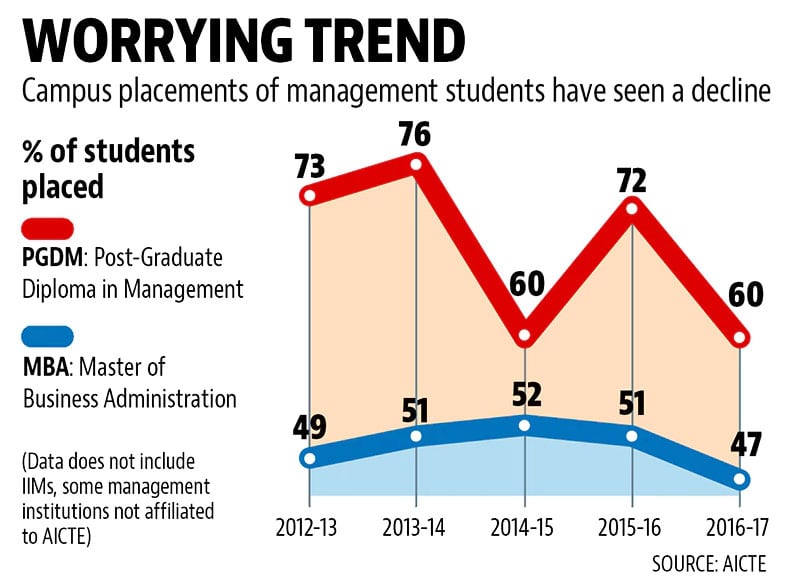New Delhi: According to official data from AICTE, jobs for fresh MBA graduates are at a five-year low, with less than half of the MBA graduates finding employment through campus placements.
According to a report in the Hindustan Times, in 2016-17, only 47% of MBA graduates received placements, an over 4% dip from the previous year. The drop was far sharper for postgraduate diploma holders – 12%.
The data does not include the premier Indian Institutes of Management (IIMs) that are not affiliated to the main regulatory body, the All India Council for Technical Education (AICTE). There are an estimated 5,000 management institutes across the country. About 200,000 students passed out of these institutes in 2016-17.
The trend has AICTE officials worried.
“It is a market-driven process and hence placements are dependent on that. We have taken cognisance of that (and) are updating and reviewing the curriculum so that it meets the requirement of the industry,” said a senior AICTE official on the condition of anonymity because he is not authorised to speak to journalists.
Human resources experts say while the job market was muted, the quality of graduates is also a concern.
“The industry is on the lookout for job-ready people which most MBA grads are not (barring those in IIMs and other top B-schools where placement is high),” said Pankaj Bansal, co-founder and CEO, PeopleStrong, a leading HR company.
No good days for youth : Fewer than half of new MBA graduates get jobs as economy sputters, trend at 5-year low.https://t.co/F3v8dZz4eH
— ASHUTOSH MISHRA (@JournoAshutosh) November 4, 2017
Until about a decade ago, management studies in India were largely restricted to the IIMs and some top private institutes. As the economy grew, demand for management graduates too soared, leading to a spurt in new private and government-backed institutes.
But in the absence of competent faculty and industry training facilities, most B-schools began churning out graduates who were far from being job-ready.
The problem mirrors the situation in engineering studies, where placement of fresh graduates from newer institutes has been declining over the past years. Currently, India produces an estimated 700,000 engineers from its 3,000 institutes but barely half of them are employable.
AICTE officials say revising the management syllabi for 3,500 affiliated institutes. The engineering curriculum is also being updated.
“We have almost completed work on the model curriculum for management institutes keeping today’s demand in mind. The revised curriculum focuses more on skills and training the students rather than theory,” said a second AICTE official.
Education experts say that would help.
“The major issue is the quality of these institutions as they not being able to align with the industry expectations. What the industry needs today they are not able to provide,” said Kamal Singh, executive director and CEO of United Nations Global Compact, India, a UN organisation looking into quality education.
“Those who are not able to provide first-hand internship to students in good companies also suffer when it comes to placements.”


